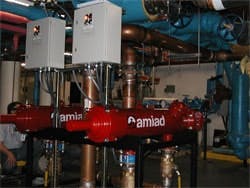Building Filtration Made Easy
Mary Washington Hospital in Fredericksburg, Va., ran into trouble when city water supply contaminants caused upsets in the hospital water systems and contributed to unreasonable replacement of cartridge filters and maintenance calls.
In general, any work on the city potable water system or fire protection activity can cause high velocities within the underground street piping systems. Debris that has settled in these pipes, consisting of pipe scale and rust colored silty material, becomes suspended in the water stream due to these changes in water velocity. This debris can enter the building water supply and affect the operation of mechanical equipment. Keeping the debris out of this equipment saves money by reducing maintenance needs and parts replacement. For these reasons, officials at Mary Washington Hospital knew that it was important to make a change.
An easy fix
After doing some research, Amiad Filtration Systems filter products were selected and installed at Mary Washington Hospital to protect developers, sterilizers, and plumbing water distribution systems.
Constructed from NSF approved materials, the self-cleaning, automatic system consists of two (2) SAF-4500 filter units, located in the physical plant area in the basement of the hospital, with a filtration degree of 10-microns. Each filter contains a self-cleaning mechanism consisting of a specially designed suction scanner. This self-cleaning technology takes advantage of simple physics for cleaning (Figure 1) .
The simplicity of design, cleaning efficiency, and reliability are just a few of the benefits of the Amiad suction scanner filters, which provide low operating and maintenance costs. These benefits make Amiad systems favorable for building, municipal and industrial applications.
Visible results
The Mary Washington Hospital was subject to a major test recently when a three-car fire erupted in the parking garage. Every fire hydrant was turned on in that area to fight the fire, and the incident occurred when hospital maintenance workers had the day off. Typically, any work on the potable water system or fire protection use causes high-flow velocities within the piping systems. When this happens, settled contaminates become agitated and suspended in the water stream, ultimately causing major system failures in the hospital.
However, the maintenance manager never received any emergency calls during the incident. After the excitement was over, the manager rushed to the filter installation to see what the flush counter indicated. The filters are set on DP/Time at 1-hour intervals, and in this case there were only 20 additional flushes than normal. The maintenance manager was quite pleased with the performance, and after checking the condition of the hospital's secondary 40-micron cartridge filtration system, there was no change found in the condition of the cartridges.
Approximately six weeks after the car incident the hospital conducted a fire pump test. Usually the fire pump test causes a disruption in the hospital water systems with plugged cartridge filters and systems shutdowns; however, thanks to the installation of the Amiad Filtration Systems products, none of these incidents occurred.
Steve Fournier is the regional manager for Amiad Filtration Systems– Eastern U.S. He can be reached at (800) 969-4055, or by email at [email protected].
